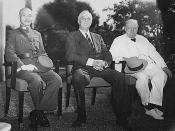On 1 October 1949, Mao Zedong, leader of the Chinese Communist Party declared victory over the Nationalist Party (Guomindang) and brought an end to four brutally long years of Civil War. The Communist victory in the Civil War has however, created significant debate among historians, namely: was a Communist victory inevitable and if so is it more sensible to see the Chinese Civil War as a Communist victory or as a Nationalist defeat?When researching these questions it becomes blatantly obvious that the Guomindang government led by Chiang Kai-Shek was riddled with problems and they are very much the cause of their own downfall. Widespread government corruption, spiraling inflation, loss of public confidence and intractable poverty are just a few of the failings the Guomindang afflicted upon the Chinese people. These monumental failings make a Communist victory seem almost inevitable, in that they just happened to be there to assume power as the Nationalists lost support and drowned in their own mistakes.
In this sense it is more sensible to view the Civil War as a Nationalist defeat, rather than a Communist victory.
On the other hand, the Communists were able to turn dismal rural poverty and the Japanese invasion into assets, using them to convince villagers that radical change was imperative and that the Communist Party was best qualified to bring about this change. Seen in this light, superior strategy and organisational methods allowed the Communists to achieve victory and not just "move into a vacuum" as suggested by Barnett (Barnett, 1965: 1).
There is certainly an element of inevitability with regard to the Communist victory, however, in this essay I will argue that not only was the outcome of the Chinese Civil War not preordained, but I will also critically evaluate the reasons the Guomindang lost the Civil War...


